|
Most parents would have had to have been in outer space for the past
few months to have completely avoided Pokémon. Virtually
everywhere we have gone we have seen kids talking about Pokémon
or trading cards. The television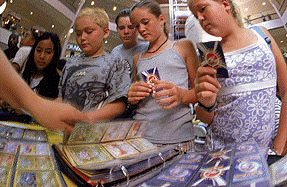 show is considered a "must see", and at the theatre its
first big screen movie boasted lines-ups of kids wanting more. The
craze, while still strong, seemed to have reached it's frenzied peak
leading up to Christmas. Our mail echoed this with letter after
letter asking, "what about Pokémon?" Rather than
rush into an answer we have chosen to take the extra time and
evaluate it (hopefully) better. Of course, we are looking at this
topic from a distinctly Biblical perspective. So here goes...
show is considered a "must see", and at the theatre its
first big screen movie boasted lines-ups of kids wanting more. The
craze, while still strong, seemed to have reached it's frenzied peak
leading up to Christmas. Our mail echoed this with letter after
letter asking, "what about Pokémon?" Rather than
rush into an answer we have chosen to take the extra time and
evaluate it (hopefully) better. Of course, we are looking at this
topic from a distinctly Biblical perspective. So here goes...
What is Pokémon?
The name "Pokémon" is short for Pocket Monsters and
is the name of a game and show originating in Japan in 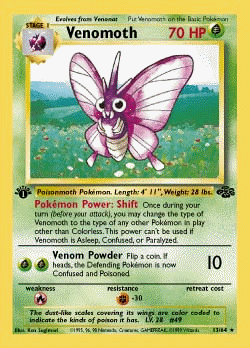 1995.
It is the success story of a young Japanese boy named Satoshi Tajiri
who liked to catch insects, save them in jars, and try to make them
fight like giant B-movie monsters Godzilla and Mothra. Tajiri went on
to form a video game company and produced a game for the Nintendo
Game Boy. Hoping for a much needed boost in sales for its game
system, Nintendo released Pokémon: Red and Pokémon:
Green in Japan. The game promptly sold 4 million copies, breaking
numerous records. 1995.
It is the success story of a young Japanese boy named Satoshi Tajiri
who liked to catch insects, save them in jars, and try to make them
fight like giant B-movie monsters Godzilla and Mothra. Tajiri went on
to form a video game company and produced a game for the Nintendo
Game Boy. Hoping for a much needed boost in sales for its game
system, Nintendo released Pokémon: Red and Pokémon:
Green in Japan. The game promptly sold 4 million copies, breaking
numerous records.
The little creatures, or monsters, featured in this game have now
become global super-stars, spanning  numerous
languages and nations. It's virtually unprecedented jump from
Japanese culture to the western world has been fueled by multiple
Nintendo video game versions (for Game Boy and N64), cartoon shows on
television, a movie, comic books, toys, clothing and footwear, CDs,
videos, DVD's, plush numerous
languages and nations. It's virtually unprecedented jump from
Japanese culture to the western world has been fueled by multiple
Nintendo video game versions (for Game Boy and N64), cartoon shows on
television, a movie, comic books, toys, clothing and footwear, CDs,
videos, DVD's, plush  toys,
posters, stickers, collectable figures, model kits, stamps, coloring
books, key chains, pencil cases, bandages, backpacks, lunch boxes and
even toasters which will brand characters' images onto your bread.
Not to be left out of this long list is the real superstar —
their wildly popular collector card game: Pokémon: The Card
Game (TCG). By design, children can't seem to get enough. Their
mantra, "Gotta catch 'em all!" has become the rallying cry
of preschoolers to college kids. toys,
posters, stickers, collectable figures, model kits, stamps, coloring
books, key chains, pencil cases, bandages, backpacks, lunch boxes and
even toasters which will brand characters' images onto your bread.
Not to be left out of this long list is the real superstar —
their wildly popular collector card game: Pokémon: The Card
Game (TCG). By design, children can't seem to get enough. Their
mantra, "Gotta catch 'em all!" has become the rallying cry
of preschoolers to college kids.
Set in a mythical realm, here people live together with exotic
creatures of all shapes and sizes. Some are somewhat familiar —
like creatures of our world (cats, foxes, turtles, fish, mice, birds
and dogs) — the remainder being totally mythic (intelligent
plants, living rocks, troublesome ghosts, and fairies). These
creatures are the 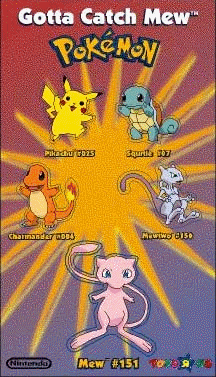 "Pokémon."
According to the story line, Pokémon "trainers"
capture and train these creatures to fight. The trainers then pit
their host of creatures against competitors for honor and
"trainer badges." The goal of every trainer is to capture
each and every Pokémon in existence and become a Pokémon
master — hence the "Gotta catch them all!" "Pokémon."
According to the story line, Pokémon "trainers"
capture and train these creatures to fight. The trainers then pit
their host of creatures against competitors for honor and
"trainer badges." The goal of every trainer is to capture
each and every Pokémon in existence and become a Pokémon
master — hence the "Gotta catch them all!"
The popularity of television Pokémon helped the WB network to
win the ratings war for the first Saturday of the 1999-2000 season
(among kids age 2 to 11). While the totals continue to add up daily,
published numbers we have seen for the first three or four years of
this craze run into tens of millions of videos games sold and over $5
billion in direct revenues.
What's it all about?
"Welcome to the world of Pokémon, a special place where
people just like you train to become the number-one Pokémon
Master in the World!" -- a web site greeting.
Fighting. This one word describes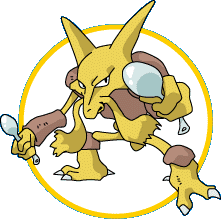 the entire focus of Pokémon. To become the most powerful you
need to fight more and more battles and, of course, win. If you think
this is a harmless topic, you might as well stop reading right now.
Like so many of today's popular video games, comic books, fantasy
role playing card games, etc., the battle is a captivating theme.
Win. Win at all cost. Don't let anyone, or anything stand in your
way. Get what you want. When our children are exposed to these
messages over and over again, we shouldn't be surprised when it
translates into how they think and act.
the entire focus of Pokémon. To become the most powerful you
need to fight more and more battles and, of course, win. If you think
this is a harmless topic, you might as well stop reading right now.
Like so many of today's popular video games, comic books, fantasy
role playing card games, etc., the battle is a captivating theme.
Win. Win at all cost. Don't let anyone, or anything stand in your
way. Get what you want. When our children are exposed to these
messages over and over again, we shouldn't be surprised when it
translates into how they think and act.
A few have trivialized the fight aspects by claiming that no one gets
killed. "In Pokémon, no matter what happens, they only
get knocked out." In fact, that makes this game perhaps even
more dangerous. Imagine the message children are being given when
they believe that no matter what you do, in these fights, it never
really hurts someone. This becomes a contributing factor for children
who have become (or are becoming) desensitized to violence, and often
don't understand the consequences of their actions. And no matter
what they claim, many kids talk about the knockouts as if they were
murders. One excerpt from an on-line talk forum ("Pokémon
Board") illustrates this well...
(The ...'s are in the original, nothing has been removed). Now my
Pokémon was Tangela... I was against Mewtwo in the nation
championship. I lost the championship... but this battle was awesome...
My enemy had only Mewtwo left... I had Jynx and Tangela. Jynx was
badly hurt... and Mewtwo took her down without breakin' a nail! I
sent out Tangela... Mewtwo used psychic and Tengela was barely hurt
at all! I was surprised! I used a solar beam and charged up... Mewtwo
used HyperBeam and Tangela was hurt... Mewtoo had full life and mine
was below half! I used SolarBeam... and it killed Mewtwo in 1
hit!!!!! That's cool.
Another person's posting reflects the fighting as well...
Hitmonlee is the best fighting Pokémon (he has the best
attacks like hi jump kick, mega kick, rolling kick, jump kick) he can
beat any other fighting Pokémon.
One more excerpt will suffice...
What are your favorite Pokémon who need an evolution stone? I
like: Vulpix, Eevee, Staryu, Weepinbell, and Gowlithe. (Another
response follows...) Nidorino evolves into a great Pokémon
named Nidoking with the moonstone.
Mystic powers, magic stones, evolving — all a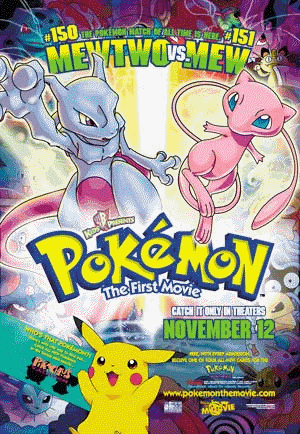 regular part of this game. A bottom-line summary of Pokémon is
that one needs to fight to win, use supernatural powers if you have
them or can get them, or evolve into a strong, better, creature as
needed. It's "survival of the fittest," of course.
regular part of this game. A bottom-line summary of Pokémon is
that one needs to fight to win, use supernatural powers if you have
them or can get them, or evolve into a strong, better, creature as
needed. It's "survival of the fittest," of course.
With more than 151 Pokémon creatures available (and at least
100 more slated for 2000), it takes a guide – or an average
10-year-old – to keep track of all the names and details.
Committing this stuff to memory is badge of honor amongst the fans.
For the fascinated, tag lines like, "Carry your pokemon with
you, and you're ready for anything! You've got the power in your
hands, so use it!," can become advice to live by.
"Ash set out again in search for more of the reclusive,
power-filled, little Pokémon. His first step was to find the
'psychic Pokémon' called Kadabra and win it from its
telepathic, pink-eyed trainer, Sabrina. With the ghost Haunter on his
side, it should have be a cinch! But Ash had underestimated the power
of his opponent. When he and Sabrina met for the battle, both hurled
their selected Pokémon into the air, yet only Kadabra evolving
into a super-monster in a magic flash..." -- a typical episode
story line.
Some individual cards are worth over $100. "Catching them
all" has led kids (and adults) to counterfeit cards, steal
merchandise, and rough up other kids. Greed. It seems the message to
win at all cost has found more than a few takers.
"Two boys, ages 12 and 13, were arrested this week after they
allegedly stole dozens of Pokémon cards from unsuspecting
youngsters." -- Nov. 99 APB news article.
"... an 11-year-old student was arrested and charged with armed
robbery after allegedly using a knife to threaten another boy and
steal numerous playing cards..." -- Another APB Nov. news article.
"Florida Boy Clashes With Teacher Over Pokémon Cards"
-- Nov. 99 Reuters Headline
Obsessed is probably the best word that would describe many fans. The
problems created by unruly behavior, fighting, and thefts, has caused
many schools and organizations to ban the cards outright.
"A San Diego law firm has filed a class-action lawsuit against
Nintendo, with plaintiffs, mainly parents, claiming Pokemon promotes
an illegal form of gambling. The lawsuit compares an alleged
addiction with the Pokemon Trading Card Game to lottery scratch
tickets and slot machines, since each Pokemon card pack has a few
high-value cards, supposedly encouraging children to want to buy more
Pokemon cards, like adults buy lottery tickets, in hopes of finding a
rare holographic Pickachu (the cute, yellow pig-like Pokemon that is
also available as a cuddly stuffed animal)." -- Debbie Moore in
a Baptist Press article (Nov. 26/99)
Pokémon 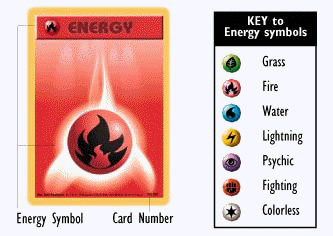 trading
cards are marketed in North America by Wizards of the Coast, Inc.,
the manufacturers of the infamous "Magic: The Gathering"
trading card game and "Dungeons and Dragons" role-playing
games. This association is not a coincidence and is being capitalized
upon by Wizards. Advertising links are strategically placed in
conjunction with Pokémon with a goal of enticing players into
these other and even "darker" games. And why not? They're
merely a next step in this genre. trading
cards are marketed in North America by Wizards of the Coast, Inc.,
the manufacturers of the infamous "Magic: The Gathering"
trading card game and "Dungeons and Dragons" role-playing
games. This association is not a coincidence and is being capitalized
upon by Wizards. Advertising links are strategically placed in
conjunction with Pokémon with a goal of enticing players into
these other and even "darker" games. And why not? They're
merely a next step in this genre.
"A global games phenomenon, Magic: The Gathering is to the 1990s
what Dungeons and Dragons was to the 1980s, but with the added
dimension of collectability. Here is the official reference to the
biggest new teen/young adult fantasy game of the decade, complete
with full-color reproductions of every existing Magic card." --
text from a related ad link targeting Pokémon players.
What's has been the Christian response?
My search for Pokémon on the internet,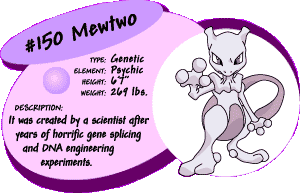 in addition to personal e-mail and first hand comments, shows that
the Christian world judges this phenomenon diversely. I found
everything all the way from "nothing to worry about" and
"it's only a game," to claims that it leads children into
the occult. There's a big difference here and both cannot be right!
in addition to personal e-mail and first hand comments, shows that
the Christian world judges this phenomenon diversely. I found
everything all the way from "nothing to worry about" and
"it's only a game," to claims that it leads children into
the occult. There's a big difference here and both cannot be right!
Those that tend to sweep away violence, calling this variation
"mild", for the most part find Pokémon quite
acceptable. Often the supernatural elements and influence are ignored
outright. One Christian organization gave the big-screen movie a
positive review, for perhaps all but the youngest of children
("possibly frightening"), 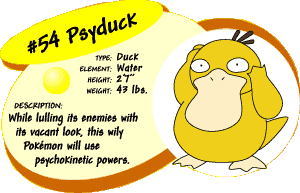 and
another reviewed the same movie's sound track as having
"Overall, good messages." This for a sound track featuring
a host of groups that regularly sing about sin and degradation. While
the organization's review did note this and even pointed out that one
of the movie's songs featured a line "[I] had no soul 'til I
found myself with rock 'n' roll", many kids and parents used
this general endorsement as a reason to accept (or tolerate)
Pokémon. Other reviews have gone so far as to try highlight
"positive elements," with some even claiming that the movie
reflected Christian values. and
another reviewed the same movie's sound track as having
"Overall, good messages." This for a sound track featuring
a host of groups that regularly sing about sin and degradation. While
the organization's review did note this and even pointed out that one
of the movie's songs featured a line "[I] had no soul 'til I
found myself with rock 'n' roll", many kids and parents used
this general endorsement as a reason to accept (or tolerate)
Pokémon. Other reviews have gone so far as to try highlight
"positive elements," with some even claiming that the movie
reflected Christian values.
A few point to supposed educational value, in the areas of math and
reading — ignoring what else they may be learning at the same
time. One of the weakest parental justifications we've heard is
"at least it gets [name here] away from the television and video
games." This too ignores any potential negative impact. What use
is trading one negative influence for another?
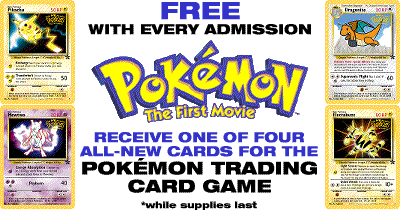
On the other extreme, I've read reviews and articles that are looking
for hidden demons. One worked to show an influence of eastern
religions and mythology. Another compared the strange names of the
characters to demon names and false gods. All this, and they seemed
to miss the straightforward and overt things. Why look for hidden
things when we have to trip over others to get there?
Probably worst of all are those that waffle on the issue, saying
"whatever you choose to do is good for you but may not be for
someone else." This smacks of today's philosophy of moral
relativism — no absolute right or wrong.
|